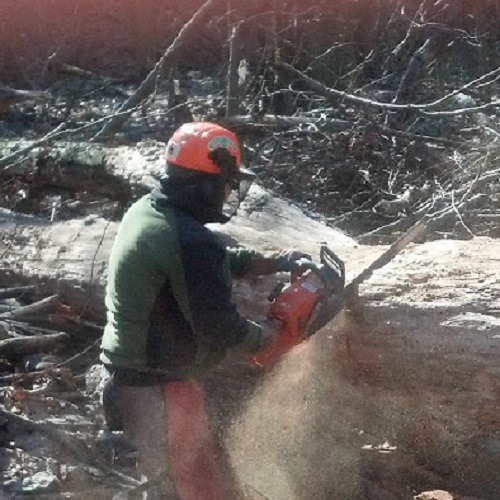Dewey Clark
January 2016

After witnessing the devastating impacts of invasive species on our trails and forests and wanting to do more to protect them, Dewey Clark dove into natural resource work.
A member of the Potomac A.T. Club’s North Chapter and Co-District Manager for PATC’s trails in Pennsylvania, Dewey is a certified sawyer and also has completed wildland fire training so he can assist in controlled burns. He and his wife Mary oversee sections of both the A.T. and the Tuscarora Trail, as well overseeing a Tuscarora shelter.
A Maryland Master Naturalist, Dewey is a member of the Mid-Atlantic Invasive Plant Council and became PATC’s club naturalist in 2015. He wants the club to become an active participant in forest health. Sharing knowledge and educating hikers about ecological issues are top priorities.
“By definition,” Dewey says, “people demonstrate interest in the forest by setting foot in it, but most don’t really see beyond the green.” In addition to trained hike leaders, he would like organized club hikes to include people who are knowledgeable about cultural resources, habitat, forest health, and geology and who can inspire hikers to “look beyond the footpath and to understand what they’re looking at.”
Hikers could be taught to recognize invasive species (such as wavy-leaf basket grass) and then report the information, helping to protect the Trail while enjoying it. Maintainers could be encouraged to learn proper removal techniques for invasives and to stay away from specific areas at certain times of the year to avoid spreading them.
Dewey is particularly interested in the interconnections among trees, plants, minerals, soil bacteria, wildlife, and pollinators—everything that affects the ecology of an area. He wants people to recognize that what they plant at home can impact the forest habitat and encourages them to become knowledgeable about native plants, moving toward planting back-yard meadows in place of grass.
Dewey has led workshops and work trips in targeted areas for invasive species control and has participated in a project to remove invasive Japanese barberry from the Big Flat pine barren in PA. That work is a part of a larger effort to restore the area to a habitat that will better support native pollinators, flora, and fauna.
Marian Orlousky, ATC resource management coordinator for the northern A.T., has worked with Dewey on that and other projects and says, “Dewey’s passion for his work is infectious, making him an excellent leader who is great at engaging new volunteers and getting the job done.”
